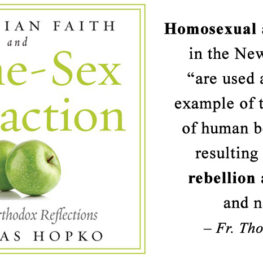TouchstoneMag | editors | Nov. 2008
There has been a steady campaign by some Christians who regard themselves as orthodox and conservative to persuade the rank and file of their Christian brothers and sisters to rethink their predictable support for political candidates who are pro-life. They bring other issues to the fore—war, torture, taxes, education, health care, and poverty—in an attempt to undermine the claim that conscientious Christians must always support pro-life candidates. They imply that such “single-issue” pro-life voting is unsophisticated, often in lockstep with the mostly uneducated “religious right,” and perhaps not even very moral in the long view.
The inclusion of other issues with abortion is, of course, an expression of the “seamless garment” argument advanced by the late Joseph Cardinal Bernardin in 1983. If there are no seams, no discernible boundaries when it comes to “life issues”—which, according to this argument, encompass all aspects of our lives, including our “quality of life”—then disrespect for or the abuse of life in one area will eventually have an effect on all the other areas. One must have, as Bernardin put it, a “consistent ethic of life.” A seamless garment will be ruined by any tear.
But in the political sphere, the promoters of the seamless garment approach to life issues do not actually exhibit the consistency they preach. Many of them do give priority to some issues over others and disagree among themselves on which issues should be considered paramount. And it is tellingly obvious that some support the seamless garment idea because it gives them cover for downplaying or ignoring abortion.
The image of the seamless garment, of course, is taken from the Passion of our Lord, when the soldiers of the state who were executing Jesus cast lots for his seamless robe rather than tear it in four pieces. The bishop and martyr Cyprian of Carthage, writing in the mid-third century, used the seamless garment of Christ as a symbol of the unity of the church. Unity is, by definition, never unity unless it is whole, without division.
It is ironic, then, to call for a “consistent ethic of life” when that ethic produces no unity of witness among Christians themselves. Attempts to promote this supposedly more nuanced ethic in politics has undermined Christian witness because what should be the seamless garment of the Church’s witness is so unraveled and frayed as to be incoherent to the world. The lack of consistent witness is all the world can see.
Consistent Through Time
The solution to this contemporary confusion is to embrace what we can clearly see as the consistent ethic of life through time. The Church, after all, is the mystical Body of Christ, which exists in its unity through all times and places. Thus, the witness of the early Church on these matters is not merely for those with an interest in history, but should be a present reality in the minds of all Christians today. It is as integral a part of the consistent ethic of life as any contemporary witness.
Upon inspection of the Christian tradition through the ages, we see an unbroken witness regarding both the high priority and the moral gravity of abortion. It is fiercely condemned by the church fathers and in early Christian writings (e.g., The Didache) as a feature of the road that “leads to death.” The condemnation of abortion, infanticide, and suicide distinguished the early Christians from the pagans. From the early days of the Church to the present, the Christian position on this particular “ethics of life” question has been consistently and unwaveringly articulated throughout the whole Christian tradition.
[…]
If human life is not defended at its source, to purport to defend it only at points downstream is inconsistent if not hypocritical. When life is defended at its source, then the mandates to feed the hungry, clothe the naked, and visit the sick and the imprisoned become aspects of a genuinely consistent ethic of life.
The seamless garment position means consistency with the Christian tradition in opposing abortion regardless of the political repercussions. If Christians are to stand in solidarity with unborn victims of Roe v. Wade, they must defend them at every opportunity.
Or will the unborn in the next life, if asked about the brevity of their earthly sojourns, reply, “Even the Christians grew tired of defending us”? God forbid.
. . . more



